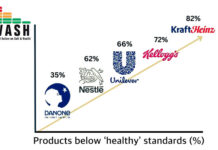Data on overweight and obesity in adults and the elderly-collected by the Istituto Superiore di Sanità (ISS) in the Passi and Silver Passi studies, over the period 2017-2020 (1,2)-induce some reflections on the health status of the Italian population. And on how to encourage its improvement, in a prevention approach that can have favorable impact on both individual quality of life and public health spending.
Nutrition returns to the center as the primary tool for healing, according to the teachings of Hippocrates. To mitigate the prevalence of serious and chronic diseases related to unbalanced diets(Non-Communicable Diseases, NCDs), which also detect as ‘comorbidities’ and are associated with complications of viral infections. (3) And strengthen the immune system at the same time (4,5). All the more reason to introduce the NutriScore system in Italy as well.
1) ISS, Steps study. Overweight and obesity in adults in Italy
1.1) Excess weight for 2 out of 5 adults.
ISS processed anthropometric data (weight, height, gender) collected through interviews during 2017-2020 from a large sample of adults (110,742) residing in every Italian region, including the autonomous provinces of Trento and Bolzano.
On this basis, the Institute estimated that:
– 42.4 percent of adults in Italy have an excessive body mass index (BMI or Body Mass Index, BMI= weight (kg) / height (m)2). In details,
– 31.6 percent of the adult population is overweight (BMI between 25 and 29.9),
– 10.8% have obesity (BMI ≥ 30).
Excess weight also exposes healthy individuals, as noted, to higher risks of cardiovascular disease and diabetes. The factors associated with this are increasing age, male identity, economic hardship and a low level of education.
1.2) Mediterranean diet out of use
The geographic gradient is sharply against the South. Campania continues to hold the top spot for overweight and obesity, affecting more than half the population. This is followed by Basilicata, Calabria, and Apulia, with similar values. Obesity rates are rising slightly, in the South as well as in the North.
Awareness is low, less than half in overweight people. Greater among the obese who nevertheless – in a minority share (10 percent), which moreover corresponds to 1 percent of the adult population in Italy, about 5.1 million people – consider their weight to be ‘just right.
Physicians’ attention is similarly low, all the more so in the South. Fewer than half of the overweight respondents report having been advised by their physician to lose weight. And it is even rarer to get medical advice on physical activity. (6)
2) ISS, Silver Steps study. Overweight and obesity in the elderly in Italy
2.1) Excess weight for 3 out of 5 seniors
The ISS Silver Steps study considers data on 50,419 over-65-year-olds, over the four-year period 2017-2020. 58.1% of the over-65s in Italy are overweight. Overweight accounts for 43.9%, obesity for 14.2% of respondents.
The South has a marked prevalence of overweight, compared with Northern Italy (63% v. 53%). Overweight is higher in men, obesity affects twice as many people with economic difficulties, 50% higher in those with low education level.
2.2) Associated pathologies
Nutritional excesses and deficiencies in the over-65s can cause the appearance of disease processes in various organs and promote the aging process of the body.
Excess weight, on the one hand, promotes the onset and/or aggravation of pre-existing diseases-dysmetabolic, cardiovascular, osteo-articular-and negatively affects a person’s quality of life. Unintentional weight loss, on the other hand, is an indicator of frailty in the elderly. (7)
3) Interim Conclusions.
3.1) Health risks in Italy.
The health risks associated with poor nutrition in Italy appear to be grossly underestimated by the same health administration that today, uniquely in Europe, is in a hurry to impose vaccines on the over-50s.
Helping citizens correct their diets is apriority need, all the more so in the country that leads the EU in average oldest age and prevalence of the elderly in all age groups.
3.2) Necessary initiatives
The Italian government must take responsibility for introducing the only nutritional information tool that scientific research has shown to serve its purposes, the NutriScore. Instead of opposing it, at the behest of Ferrero and Coldiretti.
It is also necessary to introduce mandatory training in nutrition for primary care physicians and to ensure effective monitoring of the population’s health status, with due support, in this area of prevention.
Dario Dongo and Andrea Adelmo Della Penna
Notes
(1) Epicenter, Epidemiology for public health. Steps, 2017-2020. ISS (Superior Institute of Health). https://www.epicentro.iss.it/passi/dati/sovrappeso
(2) Epicenter, Epidemiology for public health. Silver Steps, 2017-2020. ISS. https://www.epicentro.iss.it/passi-argento/dati/obesita
(3) Dario Dongo. Covid-19, a secondary disease. The scientific studies. GIFT (Great Italian Food Trade). 5/16/20, https://www.greatitalianfoodtrade.it/idee/covid-19-una-malattia-secondaria-gli-studi-scientifici
(4) Dario Dongo, Andrea Adelmo Della Penna. Diet, immune system, and viral infections. Italian scientific study. GIFT (Great Italian Food Trade). 10.3.21, https://www.greatitalianfoodtrade.it/salute/dieta-sistema-immunitario-e-infezioni-virali-studio-scientifico-italiano
(5) Carlotta Suardi, Emanuela Cazzaniga, Stephanie Graci, Dario Dongo, Paola Palestini (2021). Links between viral infections, immune system, inflammation and diet. International Journal of Environmental Research and Public Health 18:2455, https://doi.org/10.3390/ijerph18052455
(6) Moreover, the proportion of overweight people who say they are on a diet is significantly higher among those who have received medical advice (42%) than among those who have not (14%)
(7) Beyond age 75, BMI is subject to changes related to biological and pathological factors. And as people grow older, in addition to reducing the proportion of overweight people, the proportion of older people who lose weight unintentionally increases (>4.5 kg or >5% of weight in the past 12 months). 8%, in the Silver Steps study mentioned in footnote 2.









